- Home
- David Sedaris
Calypso Page 5
Calypso Read online
Page 5
Every time I visited, her apartment was more of a wreck, not just messy but filthy. “How can you live like this?” I asked the last time I was there.
“We poor people don’t have the energy to clean up after ourselves,” she told me.
After she was evicted, she lived in a series of single rooms, with people just as badly off as herself. According to Tiffany, the only thing wrong with her was her back—that’s why at the age of forty-three she went on disability, she said. Since when, though, do they prescribe lithium and Klonopin for back pain? If she’d been more forthright, we could have put her behavior in context, could have said, when she tested our patience, “That’s her illness talking.” As it was, it didn’t add up. “Why can’t a grown woman hold a job?” we wondered. “Why does she have so many restraining orders against people?”
Tiffany would have inherited money from our father someday, though she likely would have burned right through it. “You want a car?” she’d have said, perhaps to someone she met in a parking lot. “I’ll buy you a fucking Bronco or whatever. Is that what you want?”
Word would have gotten out that some lady was buying people Broncos, and in no time she’d have been penniless again and feeling just fine about it.
An hour before arriving at the beach, Hugh stopped at a fast-food place called Hardee’s so I could get a coffee. The town we were in was small and grim, and the restaurant was deserted except for us. Inside the front door stood a Christmas tree, over-decorated in a majestic combination of red and gold.
“How long has this been up?” I asked the black woman behind the counter.
She scratched at the tattoos on her left forearm, initials that looked like they’d been done at home with a sewing needle. “Since last Tuesday maybe?” She turned to the fellow cleaning the grill. “Do that sound right?”
“Just about,” he said.
“Will you have a tree at home?” I asked. “Have you put it up yet?”
This is the sort of thing that drives Hugh crazy—What does it matter if her Christmas tree is up?—but there was no one in line behind me, and I was genuinely curious.
“I think it’s too early,” the woman said. “My kids is all excited for one, but we ain’t even had Thanksgiving yet.”
Gretchen ran her good hand over the false hair on top of her head. “Will you cook a turkey on Thursday or go for something else?”
“Are you two happy now?” Hugh asked when we finally returned to the car. “Need to go back in and learn what everyone’s doing for New Year’s, or do you think we can leave?”
Gretchen propped up her broken arm on the narrow window ledge. “If he thinks we’re bad, he should spend more time with Lisa.”
“That’s true,” I agreed. “Lisa’s the master. I left her at a Starbucks for ninety seconds last year, and when I returned the woman behind the counter was saying to her, ‘My gynecologist told me that exact same thing.’”
I normally don’t believe in drinking coffee in the car. Most often, I spill more than I swallow, but without it I’d have fallen asleep and then had to revive myself once we reached the house. It was after eleven when we arrived, and I was pleasantly surprised by all the changes. The place we bought is two stories tall and divided down the middle into equal-size units. You can pass back and forth between one half and the other by way of a hotel-style connecting door in the living room, but it’s inconvenient if you’re upstairs. The two kitchens are another problem, as we really only need one. Our initial idea was to knock down some walls and transform it into a single six-bedroom home. Then I recalled our last trip to the beach and the number of times I found my brother lying on the sofa with his shoes on, and decided that two separate halves was probably a good idea. The left side, which was softly lit and decorated with carefully chosen midcentury furniture, was mine and Hugh’s, while the junky right side was for everyone else. Of course other people could stay in our half, but only when we were there to monitor and scold them.
Because everyone was coming for Thanksgiving, the house was going to be full. The family was arriving in dribs and drabs, so for the first night it was just the three of us. On the second day, late in the afternoon, Lisa pulled up. I helped her unload her car, and then we took a walk on the beach. It was cold enough to see our breath, and a strong wind was blowing. “Did I tell you I got Tiffany’s toxicology report?” she asked a while after we’d left the house. “They also sent me her death certificate, and apparently—”
At that moment a Labrador retriever bounded up, tail wagging, a middle-aged woman in a baseball cap trotting behind it. “Brandy, no,” she scolded, adding as she unfurled her leash, “I’m sorry.”
“For what?” Lisa gathered the dog’s head in her hands. “You’re beautiful, aren’t you?” she trilled in the melodic voice she uses for things with tails. “Yes, you are, and you know it.” She turned to the owner. “How old is she?”
“Two years this February,” the woman said.
“I have one that age,” Lisa told her. “And she’s a real handful.”
I have no patience for this kind of talk and turned to face the ocean, waiting for the conversation to end. Hopefully then I could learn what our sister had used to kill herself with. We figured she had taken pills—Klonopin, most likely—and though it technically didn’t matter if she’d mixed it with other things, we still wanted to know.
Behind me, Lisa was telling the strange woman that the Newfoundland water dog she had before the one she has now died after swallowing all her husband Bob’s high blood pressure medication.
“My God,” the woman said. “That must have been awful!”
“Oh, it was,” Lisa told her. “We just felt so guilty.”
The woman with the Labrador wished us a happy Thanksgiving, and as she headed down the beach, Lisa continued her story. “So they sent me the death certificate, and the cause isn’t listed as a drug overdose but as asphyxiation.”
“I don’t get it,” I said.
She sniffed her hands for dog and then stuffed them into her coat pockets. “After taking the Klonopin, Tiffany put a plastic bag over her head.” Lisa paused a moment to let that sink in. “I wrote to the state trooper who found her body and sent him a picture of her in her twenties, the pretty one we ran with her obituary. I just wanted him to know she was more than what he walked in on.”
I’ve always liked to think that before killing myself I’d take the time to really mess with people. By this I mean that I’d leave them things, and write letters, nice ones, apologizing for my actions and reassuring them that there was nothing they could have said or done to change my mind. In the fantasy I’d leave money to those who’d have never expected it. Who’s he? they’d wonder after opening the envelope. It might be a Polish lifeguard at the pool I used to go to in London, or a cashier I was quietly fond of. Only lately do I realize how ridiculous this is. When you’re in the state that my sister was in, and that most people are in when they take their own lives, you’re not thinking of anything beyond your own pain. Thus the plastic bag—the maximizer, as it were—the thing a person reaches for after their first attempt at an overdose fails and they wake up sick a day later thinking, I can’t even kill myself right.
It’s hard to find a bag without writing on it—the name of a store, most often. LOWE’S, it might read. SAFEWAY. TRUE VALUE. Does a person go through a number of them before making a selection, or, as I suspect, will any bag do, regardless of the ironic statement it might make? This is what was going through my mind when Lisa stopped walking and turned to me, asking, “Will you do me a favor?”
“Anything,” I said, just so grateful to have her alive and beside me.
She held out her foot. “Will you tie my shoe?”
“Well…sure,” I said. “But can you tell me why?”
She sighed. “My pants are tight and I don’t feel like bending over.”
I knelt down into the damp sand and did as she’d asked. It was almost dark, and as I stood back up, I
looked at the long line of houses stretching to the pier. One of them belonged to us, but I couldn’t have begun to guess which one it was. Judging by distance was no help either, as I had no idea how long we’d been walking. Lisa hadn’t spent any more time at the Sea Section than I had, so she wasn’t much help. “Does our place have one deck or two?” she asked.
“Two?” I said. “Unless it has only one?”
The houses before us were far from identical. They were painted every color you could think of, yet in the weak light, reduced to basic shapes, their resemblance was striking. All were wooden, with prominent picture windows. All had staircases leading to the beach, and all had the air of a second home, one devoted to leisure rather than struggle. They likely didn’t contain many file cabinets, but if you were after puzzles or golf clubs or board games, you’d come to the right place. The people in the houses looked similar as well. We could see them in their kitchens and family rooms, watching TV or standing before open refrigerators. They were white, for the most part, and conservative, the sort of people we’d grown up with at the country club, the kind who’d have sat in the front of the plane and laughed when the man across the aisle compared his broken overhead bin to Obamacare. That said, we could have knocked on any of these doors, explained our situation, and received help. “These folks have a house but don’t know which one it is!” I could imagine a homeowner shouting over his shoulder into the next room. “Remember when that happened to us?”
It’s silly, but after a while I started to panic, thinking, I guess, that we could die out there. In the cold. Looking for one of my houses. I was just condemning Lisa for not bringing her phone when I spotted the broken fishing rod tied to our railing. I’d noticed it earlier that day and had made a mental note to remove it. “Paul put it there so he’d be able to tell which house was ours,” Gretchen had told me.
I’d said, “Well, we’ll see about that.”
Now here I was, seeing about it.
Hugh was in the kitchen on our side of the house, making soup, when we walked in. “We got lost!” Lisa told him. “Were you worried about us?”
He dried his hands on his apron and tried to pretend he’d known we were out. “Was I ever!” The air smelled pleasantly of chicken stock and onions. On the radio it was announced that the president would be pardoning a turkey and that its name was Popcorn.
“That’s nice,” Lisa said.
While she went to her room to change, I walked through the connecting door and into the second kitchen. There I found Gretchen standing at the counter before a bowl of sliced apples.
“Did Lisa by any chance tell you about Tiffany?” I asked.
“The plastic bag, you mean?” Gretchen nodded. “She told me on the phone last week. I try not to think of it, but it’s pretty much all I can think about. Our own sister, ending up that way.”
I walked to the window and looked at the sky, which had now gone from bruise-colored to black. “Someone told me,” I said, “that in Japan, if you commit suicide by throwing yourself in front of a train, your family gets fined the equivalent of eighty thousand dollars for all the inconvenience you caused.”
From behind me, I could hear Gretchen slicing more apples.
“Of course,” I continued, “if your family was the whole reason you were killing yourself, I suppose it would just be an added incentive.”
Out on the beach I could see the beam of a flashlight skittering across the sand. Someone was walking past the house, maybe to their own place, or perhaps to one that they were renting for the long holiday weekend. If it was smaller than the Sea Section, or less well positioned, they maybe looked up into our gaily lit windows and resented us, wondering, as we often did ourselves these days, what we had done to deserve all this.
The Perfect Fit
I’m not sure how it is in small families, but in large ones relationships tend to shift over time. You might be best friends with one brother or sister, then two years later it might be someone else. Then it’s likely to change again, and again after that. It doesn’t mean that you’ve fallen out with the person you used to be closest to but that you’ve merged into someone else’s lane, or had him or her merge into yours. Trios form, then morph into quartets before splitting into teams of two. The beauty of it is that it’s always changing.
Twice in 2014, I went to Tokyo with my sister Amy. I’d been seven times already, so was able to lead her to all the best places, by which I mean stores. When we returned in January 2016, it made sense to bring our sister Gretchen with us. Hugh was there as well, and while he’s a definite presence, he didn’t figure into the family dynamic. Mates, to my sisters and me, are seen mainly as shadows of the people they’re involved with. They move. They’re visible in direct sunlight. But because they don’t have access to our emotional buttons—because they can’t make us twelve again, or five, and screaming—they don’t really count as players.
Normally in Tokyo we rent an apartment and stay for a week. This time, though, we got a whole house. The neighborhood it was in—Ebisu—is home to one of our favorite shops, Kapital. The clothes they sell are new but appear to have been previously worn, perhaps by someone who was shot or stabbed and then thrown off a boat. Everything looks as if it has been pulled from the evidence rack at a murder trial. I don’t know how they do it. Most distressed clothing seems obviously fake, but not theirs, for some reason. Do they put it in a dryer with broken glass and rusty steak knives? Do they drag it behind a tank over a still-smoldering battlefield? How do they get the cuts and stains so…right?
If I had to use one word to describe Kapital’s clothing, I’d be torn between “wrong” and “tragic.” A shirt might look normal enough until you try it on and discover that the armholes have been moved and are no longer level with your shoulders, like a capital “T,” but further down your torso, like a lowercase one.
Jackets with patches on them might senselessly bunch at your left hip, or maybe they poof out at the small of your back, where for no good reason there’s a pocket. I’ve yet to see a pair of Kapital trousers with a single leg hole, but that doesn’t mean the designers haven’t already done it. Their motto seems to be “Why not?”
Most people would answer, “I’ll tell you why not!” But I like Kapital’s philosophy. I like their clothing as well, though I can’t say that it always likes me in return. I’m not narrow enough in the chest for most of the jackets, but what was to stop me, on this most recent trip, from buying a flannel shirt made of five differently patterned flannel shirts ripped apart and then stitched together into a kind of doleful Frankentop? I got hats as well, three of them, which I like to wear stacked up, all at the same time, partly just to get it over with but mainly because I think they look good as a tower.
I draw the line at clothing with writing on it, but numbers don’t bother me, so I also bought a tattered long-sleeved T-shirt with “99” cut from white fabric and stitched onto the front before being half burned off. It’s as though a football team’s plane had gone down and this was all that was left. Finally, I bought what might be called a tunic, made of denim and patched at the neck with defeated scraps of corduroy. When buttoned, the front flares out, making me look like I have a potbelly. These are clothes that absolutely refuse to flatter you, that go out of their way to insult you, really, and still my sisters and I can’t get enough.
There are three Kapital stores in Ebisu, and their interior design is as off-putting as their merchandise. Most clothing hangs from the ceiling, though there are a few beat-up racks, and horizontal surfaces that items are strewn across. At one of the shops, the window display consisted of three carved penises arranged from small to large. The most modest was on par with a Coleman thermos, while the king-size one was as long and thick as a wrestler’s forearm. Amy’s eyes popped out of her head, and before I could stop her, she hoisted the middle one out of the window, crying, “Oh my goodness, it’s teak! I thought from out on the sidewalk that it was mahogany!” As if she were a wood expert a
nd saw nothing beyond the grain.
The salesman blinked as Amy turned the dildo upside down. Then she positioned her right hand at the base of the testicles and pretended she was a waitress. “Would anyone care for some freshly ground pepper?”
There are three other branches of Kapital in Tokyo, and we visited them all, and stayed in each one until our fingerprints were on everything. “My God,” Gretchen said, trying on a hat that seemed to have been modeled after a used toilet brush and adding it to her pile, “this place is amazing. I had no idea!”
The main reason we asked Gretchen to join us is that she understands shopping. That is to say, she understands there is nothing but shopping—unlike our brother Paul or our sister Lisa, whose disinterest in buying things is downright masculine. She and her husband, Bob, don’t exchange Christmas gifts but will, rather, “go in” on something: a new set of shelves for the laundry room, for instance, or a dehumidifier. They usually buy whatever it is in midsummer, so by December it’s been forgotten. It’s the same with their anniversary and birthdays: nothing. “But you can change that,” I often tell her.
“Right,” she says, the way I do when someone suggests I learn how to drive.
And it’s not just big-ticket items. She and I were at O’Hare Airport one afternoon and passed a place that sold nuts. “Why don’t you get some for Bob?” I asked. “They would be a nice little something to bring him as a gift.”
She looked at the stand, a cart, really, and frowned. “I would, but his dentist told him he has brittle teeth.”
“He doesn’t have to crack them open in his mouth,” I said. “Everything here is preshelled.”
“That’s OK.”
I would never leave town and not bring Hugh back a gift. Nor would he do that to me, though in truth I had to train him. He’s normally not that much of a shopper, but Tokyo seems to knock something loose in him. Perhaps it’s because it’s so far away. The difference is that he’s ashamed of it. I think it’s something he gets from his mother, who considers shopping to be wasteful, or, worse still in her book, “unserious.”

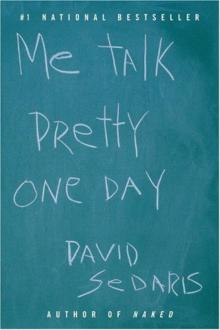 Me Talk Pretty One Day
Me Talk Pretty One Day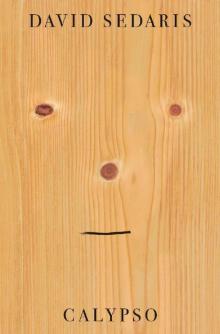 Calypso
Calypso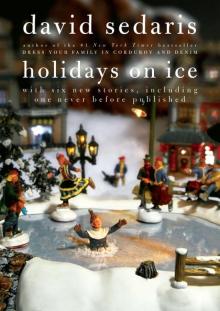 Holidays on Ice
Holidays on Ice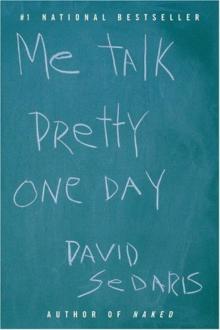 Mi vida en rose
Mi vida en rose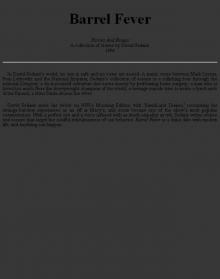 1994 - Barrel Fever
1994 - Barrel Fever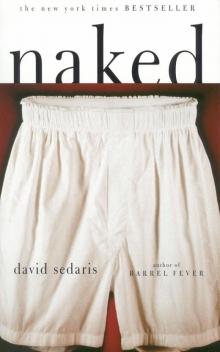 Naked
Naked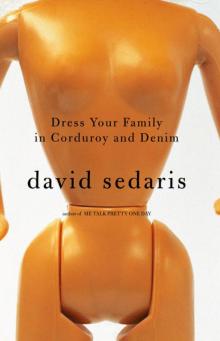 Dress Your Family in Corduroy and Denim
Dress Your Family in Corduroy and Denim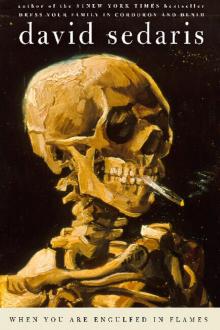 When You Are Engulfed in Flames
When You Are Engulfed in Flames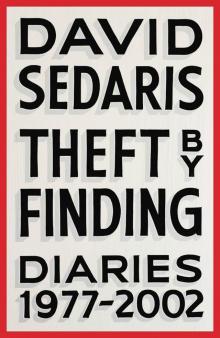 Theft by Finding: Diaries 1977-2002
Theft by Finding: Diaries 1977-2002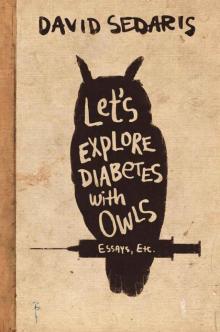 Let's Explore Diabetes With Owls
Let's Explore Diabetes With Owls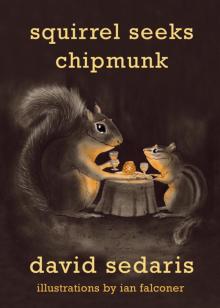 Squirrel Seeks Chipmunk: A Modest Bestiary
Squirrel Seeks Chipmunk: A Modest Bestiary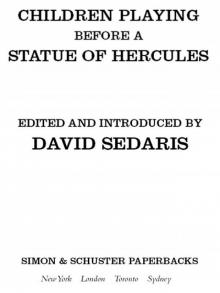 Children Playing Before a Statue of Hercules
Children Playing Before a Statue of Hercules The Best of Me
The Best of Me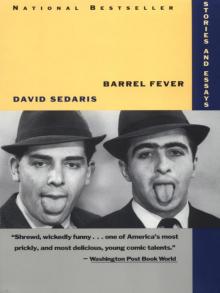 Barrel Fever
Barrel Fever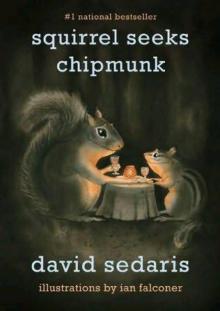 Squirrel Seeks Chipmunk
Squirrel Seeks Chipmunk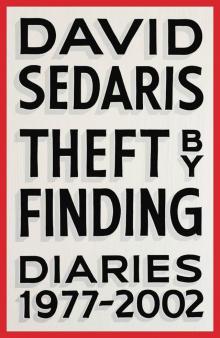 Theft by Finding
Theft by Finding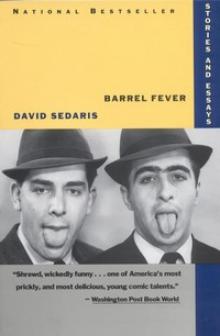 Barrel Fever and Other Stories
Barrel Fever and Other Stories